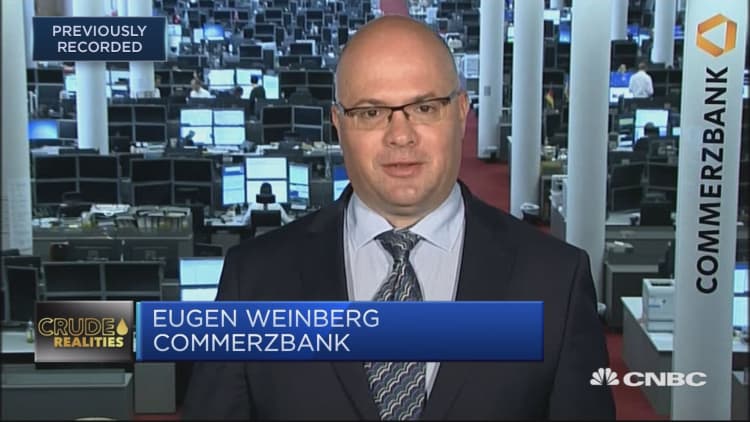Oil prices surged more than $1 a barrel on Thursday, lifted by concern about a steep drop in exports from Venezuela and concerns OPEC may not raise production at its meeting this month.
U.S. West Texas Intermediate (WTI) crude finished Thursday's session up $1.22, or 1.9 percent, at $65.95 a barrel. The contract is on pace to break a two-week losing streak.
Brent crude futures were up $2, or 2.7 percent, at $77.36 a barrel just before the close of trading, marking its first settlement above $77 in a week.
Futures contracts for gasoline and ultra-low sulfur diesel strengthened after reports of a fire at Citgo Petroleum's Corpus Christi, Texas refinery.
Crude prices got an early lift on concerns about exports from Venezuela. Gains grew when Algeria's oil minister indicated OPEC would focus on balancing the market rather than on rolling back production caps.

"They're all seeming to push back on the Saudis' push to raise production," said John Kilduff, a partner at Again Capital Management in New York. "With this more than 10 percent (price) fall, they may reconsider things as we come closer to the meeting."
OPEC member Venezuela, threatened with U.S. sanctions in the midst of an economic crisis, is nearly a month behind delivering crude to customers from its main export terminals, according to shipping data. Angola has also seen output decline rapidly from its aging fields.
In Venezuela, chronic delays and production declines could soon breach state-run PDVSA's supply contracts. Tankers waiting to load more than 24 million barrels of crude, almost as much as PDVSA shipped in April, are sitting off the main oil port, according to shipping data.
Noting Venezuela's troubles and OPEC's pending decision on supply, London Capital Group head of research Jasper Lawler said "oil traders could be in for an increased bout of volatility."
The Organization of the Petroleum Exporting Countries and other producers including Russia have cut output since 2017 to reduce a global crude glut. The group meets in Vienna on June 22 to discuss its supply policy.
Algerian Energy Minister Mustapha Guitouni said on state radio: "What matters to us is that there is a balance between supply and demand to ensure the stability of the oil markets."

OPEC-member Iraq said on Wednesday a production increase was not on the table.
This followed an unofficial request from the United States asking OPEC's effective leader Saudi Arabia to boost output.
"Venezuela's worsening economic crisis, together with ongoing geopolitical tensions in the Middle East, will remain supportive of oil prices," Abhishek Kumar, Interfax Energy senior analyst said. "Nevertheless, growing prospects for an increase in production from the OPEC Plus and rising oil output from the U.S. will cap price gains."
Crude output is surging toward 11 million bpd in the United States, which is closing in on Russia's position as the world's largest producer.
Surging U.S. production has widened the discount of WTI futures to Brent to more than $11 a barrel
— CNBC's Tom DiChristopher contributed to this story.

